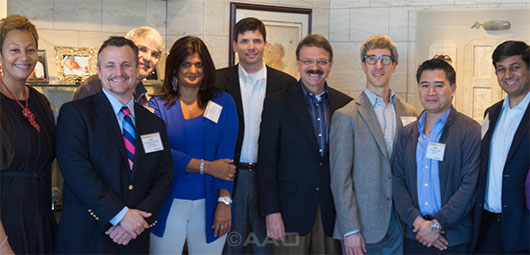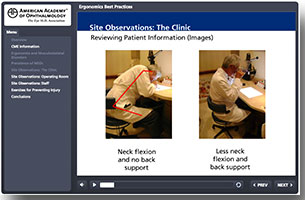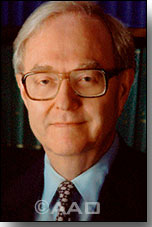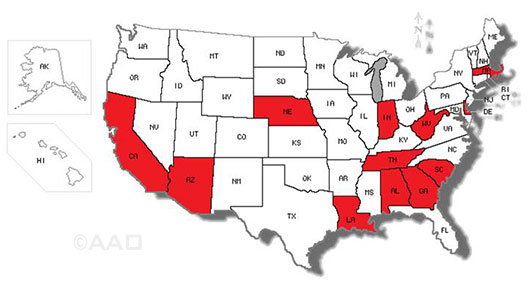What's Happening
IRIS Registry: Two Years Fee-Free If You Sign Up Now
On March 25, the Academy opened enrollment in the IRIS Registry (Intelligent Research in Sight) to all U.S. members.
What is the IRIS Registry? It is a longitudinal clinical data registry that is designed to work with any electronic health record (EHR) system.
Participation is easy. Once you have contracted with the Academy, the next step is to integrate your EHR with the IRIS Registry. Early-access users report that this is a straightforward process (see this month's Practice Perfect). After integration has been achieved, the IRIS Registry will extract data from your EHR to help automate quality reporting.
Streamline your PQRS reporting. One immediate benefit of using the IRIS Registry is that it facilitates PQRS reporting. But the clock is ticking: If you want to report for PQRS via an EHR, you must return executed agreements by June 1 and complete the integration process by Aug. 1. Even if your practice doesn’t have an EHR system, you can use the IRIS Registry Web portal for PQRS reporting.
Put your data to work. Run reports on your data to track interventions, measure outcomes, identify and address gaps in quality of care, and manage populations. You also will be able to compare your data with the IRIS Registry’s aggregated data by using benchmark reports to validate the quality of care that you’re providing and to identify specific opportunities for improvement.
Access an increasingly powerful tool. As participation in the IRIS Registry expands from its current base of early-access users and as the Academy adds more data fields, the aggregated data will become an increasingly important resource—not just for clinicians, but for researchers, too. Once the IRIS Registry accumulates a critical mass of data, it will facilitate large, registry-based clinical trials.
How to use the IRIS Registry for free. The Academy is initially offering multiyear, fee-free access to those who sign IRIS Registry agreements and meet the data-submission requirements in 2014.
For more information—including a list of EHRs that already have had their data elements mapped to the IRIS Registry—visit www.aao.org/irisregistry.
 |
|
LEADERSHIP DEVELOPMENT PROGRAM. The 16th class of the Academy Leadership Development Program (LDP) met in San Francisco in January for a two-and-a-half-day interactive session on leadership and association management topics. As part of the program, the group visited the Academy headquarters to hear President Gregory L. Skuta, MD, and the Academy vice presidents discuss key priorities and challenges for ophthalmology in 2014. The class also learned about collaborative efforts with the state, subspecialty, and specialized interest societies that nominated them to participate in the LDP. The next LDP session—Get Politically Active!—takes place on Capitol Hill on Thursday, April 10, in conjunction with the Mid-Year Forum, where Rep. Larry Bucshon, MD (R-Ind.), is slated to speak. From left to right: Anika G. Bradley, MD, Christopher A. Girkin, MD, Andrew T. Thliveris, MD, PhD, Cecily A. Lesko, MD, W. Walker Motley, MD, Academy President Gregory L. Skuta, MD, Michael S. Jacobs, MD, R.V. Paul Chan, MD, V. Nicholas Batra, MD.
|
Take Notice
EyeWiki Contest—Read the Four Winning Articles
EyeWiki is the Academy’s collaborative online encyclopedia where physicians, patients, and the public can view content written by ophthalmologists covering the spectrum of eye disease, diagnosis, and treatment. All ophthalmologists, residents, and fellows are invited to expand this valuable online resource by submitting articles.
In 2013, the Academy invited U.S. residents and fellows in training to contribute topics to EyeWiki throughout the year for an article contest. The four winning authors won free trips to this month’s Mid-Year Forum in Washington, D.C.
- Manik Goel, MD, Washington University in St. Louis: Femtosecond Lasers and Laser-Assisted In Situ Keratomileusis (LASIK)
- Sanket U. Shah, MD, Indiana University–Purdue University, Indianapolis: Vitreomacular Traction Syndrome
- Dilraj S. Grewal, MD, Northwestern University Feinberg School of Medicine: Ocular Ischemic Syndrome
- Yasser M. Elshatory, MD, PhD, Dean McGee Eye Institute: Albinism
To read the winning articles and get more information on the 2014 contest, visit www.aao.org/eyewiki.
 ONE SPOTLIGHT: Ergonomics course. Learn about ergonomic risk factors unique to ophthalmologists and what you can do to decrease your risk of injury. The Ergonomics Best Practices online course reviews everyday scenarios that place stress on your musculoskeletal system and demonstrates correct postures for the clinic and operating room. Preventive exercises are also detailed, along with advice for support staff. ONE SPOTLIGHT: Ergonomics course. Learn about ergonomic risk factors unique to ophthalmologists and what you can do to decrease your risk of injury. The Ergonomics Best Practices online course reviews everyday scenarios that place stress on your musculoskeletal system and demonstrates correct postures for the clinic and operating room. Preventive exercises are also detailed, along with advice for support staff.
To take this course, visit www.aao.org/one, click “Education,” then “Courses.” |
Academy Store
CODEquest Covers 15 Cities in April and May
The Academy coding experts are coming to 15 cities over a two-month period to present CODEquest, the premier coding seminar in ophthalmology. At this four-hour course, you and your staff will learn how to smoothly transition to ICD-10, which will launch on Oct. 1—the biggest change to health care coding in more than 30 years. If you are unable to attend CODEquest, you can order the new Conquering ICD-10 for Ophthalmology Collection, which includes a reference book, a workbook, and a 90-minute online course.
For details about CODEquest, visit www.aao.org/codequest. To order the ICD-10 collection, visit www.aao.org/store.
Webinar: Realize Your EHR’s Full Potential
On Feb. 26, the American Academy of Ophthalmic Executives presented the webinar Increasing the Productivity and Profitability of Your Practice and ASC Through Your EHR. The one-hour session covered the challenges and costs associated with EHRs, how to maximize the use of your EHR system, when and why to use an EHR system, how EHRs can improve workflow conundrums, and how EHRs can help your practice or ASC cut costs.
If you missed the webinar, you can order a recording.
To view pricing or to purchase, visit www.aao.org/aaoewebinars.
Meeting Matters
AAO 2014: Engage!
There are many opportunities at AAO 2014 to engage directly with ophthalmology’s experts and thought leaders. Some examples include Breakfast With the Experts roundtable discussions, the Academy Café, the Learning Lounge, hands-on learning at the Skills Transfer labs, and poster tours moderated by your colleagues.
Be sure to check the Online Program when it launches in June and add one or more of these events to your schedule.
Skills Transfer Program
Looking to master new techniques? During AAO 2014, Skills Transfer courses provide hands-on instruction in a small class environment and are a valuable asset in furthering your surgical skills. Lab courses in 2014 will include the following topics—and many more: cataract femtosecond laser surgery, corneal cross-linking, periocular rejuvenation with fillers and Botox, and effective use of free technology to make your lectures and presentations more interactive.
Skills Transfer labs are ticketed events that must be purchased separately. Skills Transfer lab ticket prices have been reduced, and residents receive a 50 percent discount. Many labs have an associated lecture, but these are not required for lab participation.
For more information, visit www.aao.org/skills.
Hotel Meeting Space Requests
Would your alumni or ophthalmic society like to meet during AAO 2014 in Chicago? Hotel meeting space requests are now being accepted. Assignments will be made on a first-come, first-served basis. Request space early; fees increase after Aug. 20.
For details, including hotel options, meeting times, and processing fees, visit www.aao.org/meeting_space.
Members at Large
Passages
 |
| Dr. Rubin. |
Melvin L. Rubin, MD, passed away on Feb. 23. He was 81.
Considered by many to be the father of the Ophthalmic Knowledge Assessment Program (OKAP), Dr. Rubin was a fellow of the Academy since 1963. In 1970, he served on its first Committee on Continuing Education, which led to some of the Academy’s most notable achievements including the Basic and Clinical Science Course, OKAP, the practitioners advisory group, the young ophthalmologists’ group, the journal Ophthalmology, Focal Points clinical modules, and others. In 1978, Dr. Rubin was appointed Secretary for Instruction, and in 1988 he served as Academy President. In 2010, he received the Academy’s Special Recognition Award.
Dr. Rubin graduated from the University of California at Berkeley with a degree in optometry and then earned his MD at the University of California at San Francisco. He completed his residency at the University of Iowa, then spent two years at the National Institutes of Health. He was elected Chair of the American Board of Ophthalmology, President of the Association for Research in Vision and Ophthalmology, and Council Chair of the American Ophthalmological Society.
“For more than a generation of ophthalmology residents, Mel Rubin’s Optics for Clinicians was the ‘go-to’ source for learning optics and refraction. For all ophthalmologists, his commitment to education resulted in programs that endure and remain vibrant and essential to our profession,” said David W. Parke II MD, Academy Executive Vice President and CEO.
D.C. Report
Patient Safety a Top Priority
With the majority of state legislatures in session, the Academy encourages members to join their state societies and become involved with their advocacy programs promoting patient care.
Scope of practice. This year, the Academy expects optometry to make a push for scope of practice to include surgery and the authority to prescribe controlled substances in numerous states. Expansion of optometry’s scope to include surgical privileges and/or prescription authority for highly addictive drugs presents a serious threat to patient safety. Partnering with state ophthalmic societies to deter these dangerous proposals is a top priority for the Academy.
 |
|
SURGICAL PRIVILEGES. States with optometry surgery threats.
|
Children’s eye care. Optometrists are increasingly pressuring legislators to enact laws requiring mandatory comprehensive children’s eye exams. It is ophthalmology’s position that this is poor public health policy: Because these exams occur at a single defined point in time, they incur the risk of discovering eye problems late in their course or missing problems entirely if they arise after the exam was performed.
Alternatively, the Academy supports policies that would require routine vision screenings to identify children who need comprehensive eye exams. Regular screenings help control health care costs and provide multiple opportunities throughout a child’s development to identify disease or detect problems. Thanks to the advocacy efforts of state societies in partnership with the Academy and American Association for Pediatric Ophthalmology and Strabismus, 14 states have implemented strengthened state vision-screening policies.
Truth in advertising. The Academy is advocating for federal truth-in-advertising legislation in addition to state-enacted laws. The legislation is intended to provide patients with a clear understanding of who is providing their care. Ophthalmologists have successfully advocated for passage of these laws in 19 states.
Early refill laws. In addition to the scope of practice efforts, Eye M.D. advocates are educating lawmakers on how the self-administration of prescription eyedrops involves a reasonable degree of waste when a drop misses the eye; and, consequently, early refills are often necessary to protect patients’ vision. As a result of these efforts, early refill laws have been enacted in seven states. To continue this trend, it is important for ophthalmologists to encourage state societies to proactively support policies that allow early refills.
For a directory of state ophthalmic societies, visit www.aao.org/statesocieties.